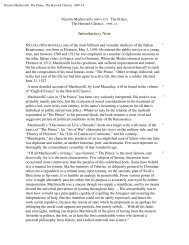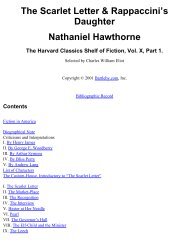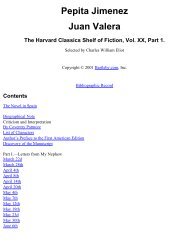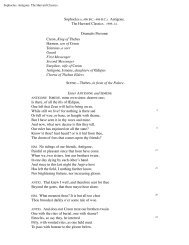Notre Dame de Paris - Bartleby.com
Notre Dame de Paris - Bartleby.com
Notre Dame de Paris - Bartleby.com
You also want an ePaper? Increase the reach of your titles
YUMPU automatically turns print PDFs into web optimized ePapers that Google loves.
“The does not concern us.”<br />
“The plague it doesn’t!”<br />
“She saved your life. It is a <strong>de</strong>bt you ought to pay.”<br />
“There is many another I don’t pay.”<br />
“Maitre Pierre, this must be done.” The Arch<strong>de</strong>acon spoke imperiously.<br />
“Hark you, Dom Clau<strong>de</strong>,” returned the poet in consternation. “You cling to that i<strong>de</strong>a, but you are<br />
wrong. I see no reason why I should hang instead of another.”<br />
“What is there to attract you so firmly to life?”<br />
“Ah, a thousand things!”<br />
“What, pray?”<br />
“What?—why, the air, the sky, the morning, the evening, moonlight, my good friends the vagabonds,<br />
our pranks with the women, the fine architecture of <strong>Paris</strong> to study, three important books to write—one<br />
of them against the bishop and his mills; oh, more than I can say. Anaxagoras said that he was in the<br />
world merely to admire the sun. And besi<strong>de</strong>s, I enjoy the felicity of passing the whole of my days, from<br />
morning till night, in the <strong>com</strong>pany of a man of genius—myself, to wit—and that is very agreeable.”<br />
“Oh, empty rattle-pate!” growled the Arch<strong>de</strong>acon. “And who, prithee, preserved to thee that life thou<br />
<strong>de</strong>emest so pleasant? Whose gift is it that thou art breathing the air, looking at the sky, hast still the<br />
power to divert thy feather-brained spirit with folly and nonsense? But for her, where wouldst thou be?<br />
Thou wouldst let her die, then—her through whom thou lives? Let her die—that being so lovely, so sweet,<br />
so adorable—a creature necessary to the light of the world, more divine than God himself! whilst thou,<br />
half philosopher, half fool—mere outline of something, a species of vegetable that imagines it walks and<br />
thinks—thou wilt go on living with the life thou hats stolen from her, useless as a torch at noon day?<br />
Come, Grainier, a little pity! be generous in thy turn; ’taws she that showed thee the way.”<br />
The priest spoke vehemently. Grainier listened at first with an air of in<strong>de</strong>cision; presently he was<br />
touched, and en<strong>de</strong>d by making a tragic grimace which ma<strong>de</strong> his wan visage like that of a new-born infant<br />
with the colic.<br />
“You are in truth most pathetic,” said he, wiping away a tear. “Well, I’ll think on it—’tis an odd i<strong>de</strong>a of<br />
yours, that. After all,” he pursued, after a moment’s silence, “who knows; may-be they would not hang<br />
me—’tis not every betrothal that ends in marriage. When they find me in my hiding-place thus<br />
grotesquely disguised in coif and kirtle, it is very possible they will burst out laughing. On the other<br />
hand, even if they do hang me—well, the rope is a <strong>de</strong>ath like any other—nay, rather it is not <strong>de</strong>ath like<br />
any other—it is a <strong>de</strong>ath worthy of a sage who has swung gently all his life between the extremes—a <strong>de</strong>ath<br />
which, like the mind of the true sceptic, is neither flesh nor fish; a <strong>de</strong>ath thoroughly expressive of<br />
Pyrrhonism and hesitation, which holds the mean between heaven and earth, which holds you in<br />
suspension. ’Tis the <strong>de</strong>ath of a philosopher and to which mayhap I was pre<strong>de</strong>stined. It is magnificent to<br />
die as one has lived!”<br />
The priest interrupted him. “So it is a bargain, then?”










